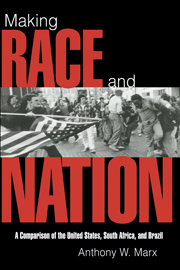Book contents
- Frontmatter
- Contents
- Preface and Acknowledgments
- 1 Introduction
- Part One Historical and Cultural Legacies
- 2 Trajectories from Colonialism
- 3 Lessons from Slavery
- 4 The Uncertain Legacy of Miscegenation
- Implications
- Part Two Racial Domination and the Nation-State
- Part Three Race Making from Below
- Notes
- Bibliography
- Index
4 - The Uncertain Legacy of Miscegenation
Published online by Cambridge University Press: 05 June 2012
- Frontmatter
- Contents
- Preface and Acknowledgments
- 1 Introduction
- Part One Historical and Cultural Legacies
- 2 Trajectories from Colonialism
- 3 Lessons from Slavery
- 4 The Uncertain Legacy of Miscegenation
- Implications
- Part Two Racial Domination and the Nation-State
- Part Three Race Making from Below
- Notes
- Bibliography
- Index
Summary
How were later race relations influenced by the extent to which blacks and whites mixed during colonialism and slavery, and the subsequent treatment of “mixed race” peoples? To answer, it is necessary to examine both the early historical record and debates, and how mulattoes were treated and categorized after slavery and colonialism were ended. If such practices varied over time in each country, then the determinacy of miscegenation will appear less certain.
How miscegenation shaped race relations has been most prominently explored in attempts to explain post-abolition Brazil's lack of racial domination and conflict. Analysts have suggested that this “exceptionalism” was the result of greater “cross-race” mixing in Brazil. Descendants of Africans and Europeans commingled in Brazil in extraordinarily high numbers. Their mulatto offspring were treated as an intermediary population both before and after abolition. This mixing and social fluidity supposedly made it impossible for Brazil to develop a strict biracial order, thereby also diminishing the prospect for racial conflict. I will address each of these arguments for Brazil, and in comparison with South Africa and the United States.
The high degree of miscegenation in Brazil was the result of historical circumstance, not cultural predilections. Though Freyre and others argued for a Portuguese Catholic tradition of racial tolerance dating back to contact with the Moors, no consistent Luso-tropical laxity toward miscegenation is evident. Portuguese settler colonials in Africa cohabited with blacks extremely rarely.
- Type
- Chapter
- Information
- Making Race and NationA Comparison of South Africa, the United States, and Brazil, pp. 65 - 76Publisher: Cambridge University PressPrint publication year: 1997

